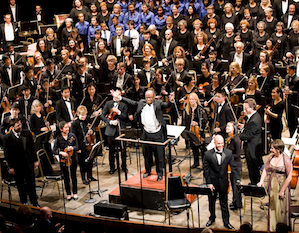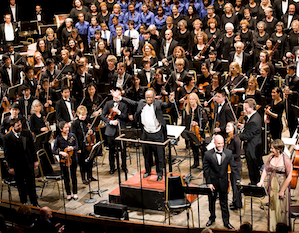
At the start of its 25th anniversary season, the Oakland East Bay Symphony has every right to feel proud. Under the leadership of Music Director Michael Morgan — who has led the orchestra for all but one of its 25 years — the OEBS has developed into an organization whose multicultural programming and outreach puts the community first.
It is also an orchestra unafraid to tackle major works, as it showed in a November 8 season opener at the Paramount Theatre, that honored the bicentennials of two great European composers. How much bigger could you get than Giuseppe Verdi’s Overture to La Forza del Destino and “Ritorna vincitor!” from Aida followed by two of the grandest possible excerpts from Richard Wagner’s Götterdämmerung, “Siegfried’s Rhine Journey” and “Brünnhilde’s Immolation Scene,” with dramatic soprano Othalie Graham as soloist? And what better way to honor this uniquely American orchestra’s history than by preceding those with Aaron Copland’s classic Appalachian Spring, and Mason Bates’ Mothership, by a composer who received his very first professional orchestral airing from OEBS?
Morgan was at his best at the microphone as he offered an amusing introduction to Mothership. Even if the piece itself, commissioned for the Michael Tilson Thomas-led YouTube Symphony Orchestra 2011, is much ado about nothing much at all, Morgan made his loyal audience feel at home with his delightful, “I kid you not” explanation of the silly sound that signals the docking of four spaceships. It was the perfect introduction to an electro-acoustic piece that, despite its occasional techno beat and opportunities for improvisation on the part of its four soloists, ultimately sounds rather conventional.
Not even OEBS’ fairly new, portable sound reinforcement apparatus could change the fact that the Paramount’s acoustics suck far too much color out of instruments, and vitiate warmth and sweetness. In Appalachian Spring, these deficiencies were further underscored by often-square, wonder-deficient playing that, at times, suggested that Martha Graham and her dancers must have been a heavy footed, distinctly charmless lot.
Thankfully, nothing could dim Wagner’s brilliance. Even if the orchestra’s strings were less than silken in the “Rhine Journey,” and the waves of color that Wagner intended to wash over his audience were compromised by the acoustics, the great heart-tugging emotions at the core of the Götterdämmerung excerpts came through. It’s hard to feign “objectivity” when discussing performances that left me with a lump in my throat and on the verge of tears.
Nothing could dim Wagner’s brilliance ... It’s hard to feign “objectivity” when discussing performances that left me with a lump in my throat and on the verge of tears.
Graham is certainly a force to be reckoned. Given the power of the orchestra, it was difficult to tell if the slow beat that affected her singing in “Ritorna vincitor!” had evened out in the Immolation Scene, or if the orchestra, which Morgan did not reign in during forte passages, simply covered it over. But whenever she had a fighting chance, the depth of her lower range and the impressive power of her solid highs spoke eloquently of Brünnhilde’s plight.
Despite a lack of translations, the beauty of Graham’s singing and the dignity of her bearing spoke volumes as the Valkyrie rode to her death. If only Morgan hadn’t drowned out much of her final, downward descent. Nonetheless, in her wake came one of the more glorious orchestral depictions of Walhalla’s incineration that I’ve ever witnessed, with the horns and percussion going whole hog. Through it all, the longing at the heart of Graham's performance shone through. It was a wonderful performance
Earlier, Graham’s lack of finesse in some of the high writing of “Ritorna vincitor!” suggested that her volume may be achieved, in part, by sacrificing flexibility. The aria’s ending was also disappointing, the tempo too strict. It must also be said that, in the Forza overture, while the orchestra’s strings palpably cried and sighed, and tempos were spot on, the balance was less than ideal, with horns and lower lines overwhelming the high strings on too many occasions, and the harp far too prominent. But the greatness that OEBS and Graham achieved in the Immolation Scene affirmed that Morgan’s gifts lie, not just in creating community, but in also gifting it with all the glorious power and poetry that music can convey.

